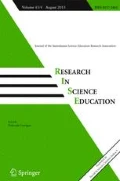Abstract
Since the early 1980s we have been engaged in the design, implementation, and evaluation of “cognitive acceleration” programs, which claim to enhance students’ general intellectual processing skills. We have published extensive data showing long-term effects of these programs on students’ cognitive development and academic achievement. In this paper the theory base of cognitive acceleration will be briefly outlined and some typical results re-presented. The main body of the paper will be devoted to a discussion of a number of issues which arise from the analysis of long-term effects. Although the examples will be drawn from the cognitive acceleration programs, the issues are general ones which might apply to any long-term study.
Similar content being viewed by others
References
Adey, P. (1997). It all depends on the context, doesn’t it? Searching for general, educable, dragons. Studies in Science Education, 29, 45–92.
Adey, P. (2003). Changing minds. Educational and child psychology, 20(2), 19–30.
Adey, P., Hewitt, G., Hewitt, J., & Landau, N. (2004). The professional development of teachers: Practice and theory. Dordrecht, The Netherlands: Kluwer.
Adey, P., Nagy, F., Robertson, A., Serret, N., & Wadsworth, P. (2003). Let’s think through science! London: NFER-Nelson.
Adey, P., Robertson, A., & Venville, G. (2001). Let’s think! Slough, UK: NFER-Nelson.
Adey, P., Robertson, A., & Venville, G. (2002). Effects of a cognitive stimulation programme on Year 1 pupils. British Journal of Educational Psychology, 72, 1–25.
Adey, P., & Shayer, M. (1993). An exploration of long-term far-transfer effects following an extended intervention programme in the high school science curriculum. Cognition and Instruction, 11(1), 1–29.
Adey, P., & Shayer, M. (1994). Really raising standards: Cognitive intervention and academic achievement. London: Routledge.
Adey, P., Shayer, M., & Yates, C. (2001). Thinking science: The curriculum materials of the CASE project (3rd ed.). London: Nelson Thornes.
Birmingham City Council (1997). Signposts. Windsor, UK: NFER-Nelson.
Carroll, J. B. (1993). Human cognitive abilities. Cambridge, UK: Cambridge University Press.
Cohen, L., & Manion, L. (1994). Research methods in education (4th ed.). London: Routledge.
Cronbach, L., & Furby, L. (1970). How should we measure change, or should we? Psychological Bulletin, 74, 68–80.
Forsman, J., Adey, P., & Barber, J. (1993, April). A thinking science curriculum. Paper presented at the American Association for the Advancement of Science, Boston, MA.
Hautamäki, J., Kuusela, J., & Wikström, J. (2002, July). CASE and CAME in Finland: “The second wave.” Paper presented at the 10th International Conference on Thinking, Harrogate, UK.
Lazar, I., & Darlington, R. (1982). Lasting effects of early education: A report from the consortium for longitudinal studies. Monographs of the Society for Research in Child Development, 47(2/3).
Mayo, E. (1945). The social problems of an industrial civilization. Boston, MA: Harward University.
Prieler, J. (2001, April). The value of derivative scores. Paper presented at the annual meeting of British Psychological Society, Glasgow, UK.
Raven, J. (1998). Coloured progressive matrices. Oxford, UK: Oxford Psychologist’s Press.
Shayer, M. (1999). Cognitive acceleration through science education II: Its effect and scope. International Journal of Science Education, 21(8), 883–902.
Shayer, M., & Adey, P. (Eds.). (2002). Learning intelligence: Cognitive acceleration across the curriculum from 5 to 15 years. Milton Keynes, UK: Open University Press.
Shayer, M., Wylam, H., Küchemann, D., & Adey, P. (1978). Science reasoning tasks. Slough: National Foundation for Educational Research.
Stenhouse, L. (1975). An introduction to curriculum research and development. London: Heinemann Educational Books.
Sternberg, R. J. (2003). Cognitive psychology. Belmont, CA: Wadsworth.
Sylva, K., & Ilsley, J. (1992). The high scope approach to working with young children. Early Education, Spring, 5–7.
Vernon, P. E. (1971). The structure of human abilities. London: Methuen.
Zigler, E., & Burman, W. (1983). Discerning the future of early childhood intervention. American Psychologist, 38, 894–906.
Author information
Authors and Affiliations
Corresponding author
Rights and permissions
About this article
Cite this article
Adey, P. Issues Arising from the Long-Term Evaluation of Cognitive Acceleration Programs. Res Sci Educ 35, 3–22 (2005). https://doi.org/10.1007/s11165-004-3430-5
Issue Date:
DOI: https://doi.org/10.1007/s11165-004-3430-5




